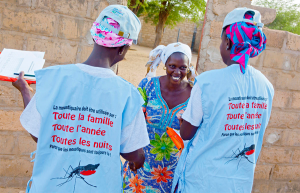What Does Behavior Change Have to do with World Health Day?
This past Monday, we celebrated World Health Day, which focused on combating the global threat of vector-borne diseases. According to the World Health Organization, more than one billion people are infected and more than one million die every year from vector-borne diseases, such as malaria, dengue, Lyme disease, and yellow fever.
WHO produced the following short video, highlighting simple measures we can take to protect ourselves from mosquitoes, flies, ticks, and bug that may threaten our health.
These diseases can be managed and prevented by using insecticide-treated mosquito nets, improving sanitation, and reducing mosquito breeding sites. Each of these intervention approaches requires some amount of behavior change.
One bite of a mosquito, a sandfly, a blackfly, or a tick can be more than annoying. It can be fatal.

Health workers in Senegal deliver mosquito nets to a woman during an anti-malaria campaign home visit.
© Diana Mrazikova/ Networks, Courtesy of Photoshare
Behavior change communication (BCC), also known as social and behavior change communication, is one approach to health communication. With interventions ranging from interpersonal communication between a community health worker and her client to multi-level mass media campaigns, evidence-based and theory-driven health communication interventions are an integral part to the control of vector-borne diseases as well as promotion of a variety of health behaviors and prevention of a number of diseases.
Recently, Koenker et al. (2014) argued that “as progress is made towards malaria elimination, BCC becomes an even more important tool.” For example, BCC can address some of the well-documented behavioral barriers to malaria control such as: the inconsistent or non-use of bed nets; delays in seeking effective treatment; and the distribution of intermittent preventive therapy (IPTp) without fully explaining its use to pregnancy women.
BCC increases the likelihood of a good return on investment for malaria programmes. It increases the likelihood that nets are used, artemisinin-combination therapy (ACT) and sulfadoxine-pyrimethamine (SP) are not wasted, and that insecticide for indoor residual spraying (IRS) programmes reach their target coverage levels.
For more on designing and implementing effective health communication interventions that can increase knowledge, shift attitudes and norms, and produce desired changes in behavior, check out the new Global Health eLearning course on Health Communication for Managers.








Leave a Reply
Want to join the discussion?Feel free to contribute!